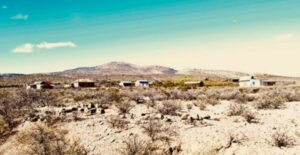1 Peter 1:3-4
3 Blessed be the God and Father of our Lord Jesus Christ, who according
to His great mercy has caused us to be born again to a living hope through
the resurrection of Jesus Christ from the dead, 4 to obtain an inheritance
which is imperishable, undefiled, and will not fade away,
— NASB
The idea of a ghost town is a fascination to me. When you grow up in the
East, there is little opportunity for a whole town to cease to exist, leaving
only abandoned buildings and an imprint of what used to be. There are
enough people and resources east of the Mississippi to reimagine
someone else’s collapsed dreams. We change schools into apartments,
mills into malls, and churches into restaurants. So the reality that a whole
town could be abandoned is sad and mysterious.
I stayed at Elephant Butte Lake State Park in New Mexico for two days,
which gave me more time than usual to explore the area. On the local
“Things to Do” list was a map of ghost towns in the area. I started out on a
beautiful February morning to see what I could glean from them. One
town had been connected to mineral mining, and it was a small cluster of
weathered homes and stores with a metal gas sign that swung with an
eerie sound. The next town was Hillsboro, the name of my hometown
(although spelled differently).
Though most of it was abandoned with tumbleweed rolling down its main
street undisturbed, there was some evidence that people lived there; cars
parked on the street and clothes hung on a line. The church was abandoned
but not boarded-up; the stores were empty except for the post office. I saw no
people at all as I drove around town, and I kept expecting a TV crew to call
“cut” and people emerge from their homes. I stayed about 30 minutes, riding
around and looking for signs of life. There is something haunting about a
ghost town, but even more so when it feels like it lingers on palliative care. It
is easier to walk through a graveyard and look at history than to walk through
a hospice facility and infringe on someone’s grieving process.
How did a town transform from a place of belonging to a town with no hopes
and dreams? Sometimes, what brought them together no longer exists. Some
towns were the crossroads for the family farm, but the farms are no longer
family-owned. Sometimes the resources that lured them there played out;
the coal, silver or gold are no longer enough to sustain them. Or sometimes, a
natural catastrophe hurt it so badly that it could not recover.
I wonder if that is how some people feel when they look at our churches?
Churches used to be full of dreams and a passion to reach out to people with
the Good News. Now some churches are just trying to keep the doors open.
Some gather mostly to remember how it used to be rather than to dream
about how it could be. They only welcome the closest members, while they
reminisce about how to divvy up the traditions and valuables. Some churches
have become virtual ghost towns long before the pandemic. More and more
wonder what goes on inside because they have no relationship with their
local communities of faith. The brave outsiders may get close enough to look
in the windows of the churches, but never risk going in. Let us not think of
church as a business, but as embassies of a living and vibrant Savior. We must
open the doors which are often closed out of fear and step out on the porch
and even into the streets to welcome the curious, the isolated and the
injured.
Prayer:
Oh God, As we reflect and ponder the walk to the cross, let us reimagine what
we have to offer our world locally and reassess our resources from
diminishing to replenishing. Help us to draw on the strength of the One who
faced His own demise with an assurance of the resurrection. May we embody
the Living Christ and believe that His church is alive. Let us reimagine, let us
throw open the doors and breathe in life and share a pulsating Hope. Amen




